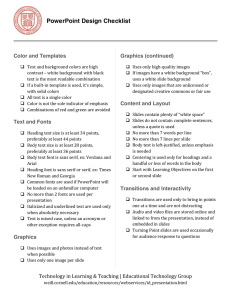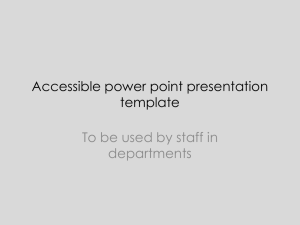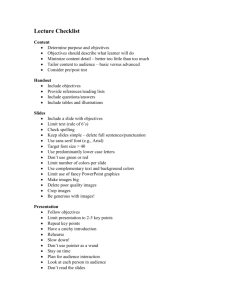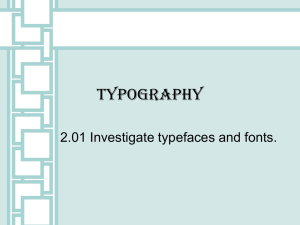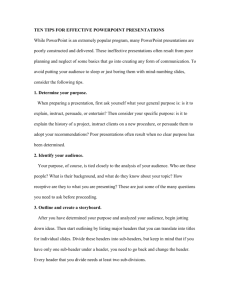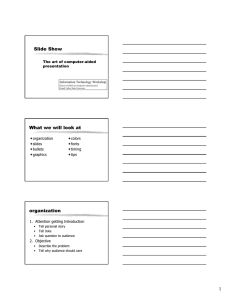Using Visual Aids Effectively
advertisement
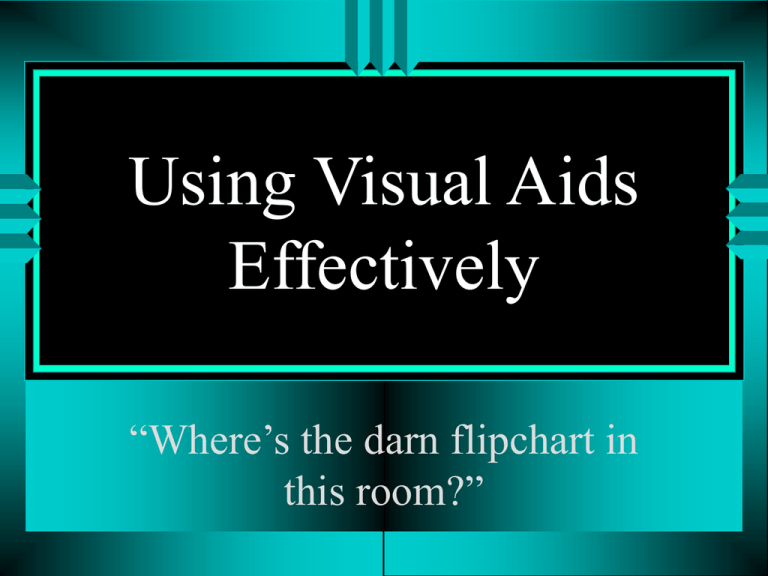
Using Visual Aids Effectively “Where’s the darn flipchart in this room?” Why Use Visual Aids? They save time and add interest They improve listener understanding They improve listener retention They allow for different learning styles Verbal and Visual Recall 90% 80% 70% 60% 50% 40% 30% 20% 10% 0% Verbal Only Visual Only Verbal and Visual After 3 hrs. After 3 days Types of Visual Aids: Advantages and Disadvantages Overhead Transparencies Slides Flip Charts and Posters Objects and Models Handouts Whiteboards and Chalkboards Computer Assisted Audiovisuals Guidelines for VAs The VA should never become the REASON for the speech The VA should be appropriate for the length and format of the speech Know what technology will be available to you The higher the tech, the more you need redundancy and backup--Burnett’s rule of VA Size Matters This is a 20 point font This is a 32 point font This is a 48 point font This is a 60 point font This is a 72 point f Type Fonts Serif fonts versus Sans Serif fonts This is a sans serif font--This is Arial This is a font with serifs--This is Times New Roman More On Fonts Please see the overhead projector for more on fonts Additional Guidelines for Text Use only 4-6 lines of text per VA Use phrases, not full sentences Use Upper Case and Lower Case for ease of reading Leave the same space at the top of a VA Limit lines to no more than 40 characters Use Clip Art to Keep Interest The text can be placed here on the left, and the picture on the right How Not to Use PowerPoint In most situations, PowerPoint should NOT be used as a running outline as we do here! Use PowerPoint to generate illustrations of particular data points or pieces of support Slides are easily printed to overheads using specialized inkjet and laser jet overheads (print on the rough side!) Kinko’s (and others) can do the job! Technology and Its Impact on Communication in Organizations “I’ll have my fax call your fax with my email address.” Some Trends Regarding Technology Organizational decentralization, both geographically and managerially Increases productivity, decreases in employees Dramatic increases in information sharing Dramatic decreases in middle level management Increased use of contract workers Theoretical Approaches to Technology Neil Postman--Amusing Ourselves to Death Thesis--The dominant technology of the age has a profound effect on what passes for truth in a culture Applied to business--increasing information technology will color our judgments about the credibility of information produced by other means Some Email Statistics 1991--8 million had email access 1997--67 million have access 1999--108 million have access Office workers exchange 25.2 BILLION message DAILY 20% of US businesses randomly check employee email Some Email Litigation Nightmares “Yes, I know we shipped 100 barrels of [deleted], but on our end, steps have been taken to ensure that no record exists. Therefore, it doesn’t exist. If you know what I mean. Remember, you owe me a golf game next time I’m in town.” Litigation Nightmares, cont. “Did you see what Dr. [deleted] did today? If that patient survives it will be a miracle” “Hi David, please destroy the evidence on the [litigation] you and I talked about today, Thx, Laura.” “Hi Laura. Ack yr. msg. and taken care of. Aloha, David” Email Overview Remember, email belongs to the company [Electronic Communications Privacy Act, 1986] It is retrievable even after deletion Monitoring by the company is legal, that is, you have no expectation of privacy If you have a private email address that also gets used for business, expect no privacy here either Email in Practice Don’t write anything you wouldn’t want to see on the front of the New York Times Don’t ever respond in anger DON’T USE ALL CAPS, IT LOOKS LIKE YOU ARE SHOUTING!!! Understand your company’s email policy Steinfield Email Study, 1990 (Xerox) Do the business advantages of email outweigh the social costs? Yes: People learned more rapidly, social contacts valuable, increased quality of work life, increased creativity No: responses often seem overly critical or blunt, no tempering context Teleconferencing--Pros and Cons Advantages: shorter meetings, more task oriented, more organized, more equal participation regardless of status, more open exchange of ideas, less likely to be swayed by group norms, less threatening Disadvantages: fewer nonverbal cues to aid interpretation, tech uncertainty Videoconferencing Advantages: almost all of teleconferencing plus better chance of getting nonverbals Disadvantages: startup costs ($20-25,000), tech uncertainty2 Intranets and Organizational Communication Defined--any LAN or WAN capable of supporting internet applications What’s on one?--Policy manuals, benefits info, price lists, product catalog, marketing literature, newsletters and announcements, online help, reports, customer data Why do it--access for employees + staff, transparency, efficiency Caveats--security, disclosure?
